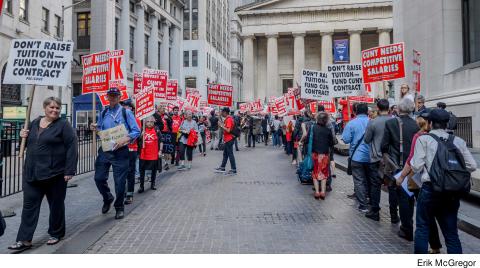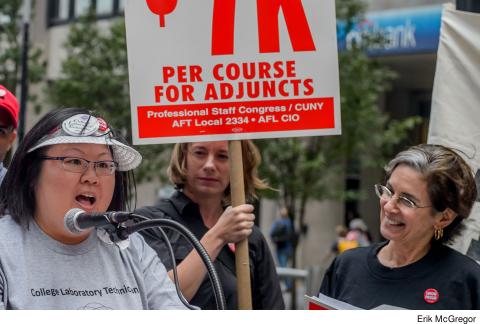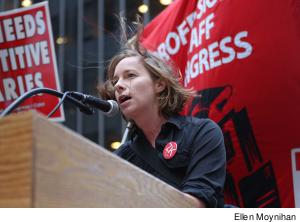No to cuts
 |
The timing wasn’t accidental.
On September 27, 600 PSC members from all titles and campuses formed a picket line in front of the New York Stock Exchange and marched through the Financial District to the offices of Siebert Cisneros Shank and Company, the financial firm at which CUNY Board of Trustees Chairman William Thompson is chief administrative officer. The September 27 date of the march coincided with the seventh anniversary of the birth of the Occupy Wall Street movement, which, pointed out that austerity and disinvestment in public institutions is directly connected to the rapaciousness of the financial sector.
PSC members rallied to make a similar point: Wall Street and New York City’s finance sector, aided by President Trump’s pro-corporate tax policy, increasingly hoards wealth as CUNY, recognized as one of the nation’s most important engines for upward social mobility, is increasingly starved of funds. The union gathered to urge Thompson and the CUNY board to demand full funding from Albany for the next PSC contract and to settle a contract that includes real raises for all faculty and staff, equity increases for the lowest-paid full-time staff and faculty, and an increase in, adjunct pay to $7,000 per course.
Below are excerpts from the speeches delivered by PSC activists. President Bowen’s speech is excerpted on page 8.
SHOW US THE MONEY
 |
We hear, “Oh, but the budget, oh, but there’s no money.” Well, look around. Where have we just finished walking? These halls of wealth, the wealth that is dripping from these buildings, the wealth of New York, the wealth of this state, the wealth of this country needs to be redistributed. That’s where the wealth is.
It has been seven years this month that the Occupy Wall Street movement shed a light on inequality. They shed a light and yet seven years later, inequality in this city, inequality at CUNY and in this country is worse than ever. And we will not tolerate that.
CUNY management says they raise students out of poverty, and they do, but they pay substandard salaries to full-time faculty and staff and near-poverty wages to part-time faculty at CUNY. We need Bill Thompson, whose company is here, whose investment banking firm is here, we need Bill Thompson to call on all of the Board of Trustees, to call on all of the CUNY administration, to call on the state government and the city government to invest in CUNY, to give us the funding, to find the money.
We are the PSC. We have been strong for many years, we are strong now and we will become even stronger. We were threatened by the recent Supreme Court case [Janus v. AFSCME] but it did not stop us. What’s more, it strengthened us. You should know and CUNY knows that our membership is larger than ever. Our commitment is larger than ever. Our unity is larger than ever. We will not give up, we will not stand down. We know what has to be done and we’re going to continue calling for it.
Andrea Vásquez
PSC First Vice President
Graduate Center
A STRUCTURAL DEMAND
I want to make two arguments today. One, that the demand for $7K is a moral demand. This is a nominally social democratic city in which no public sector employee should be paid poverty wages. It is a travesty that there are 12,000 adjuncts paid poverty wages in New York City, where there is more wealth amassed than any city on this entire planet.
But I also want to make the case to you that $7K is a structural demand. We are doing nothing short of attempting to change the structure of the CUNY labor force. Without adequate adjunct pay, this system will continue to adjunctify and the system of tenure will be eroded to the point that it will no longer exist. We are demanding $7K in order to change the incentives of management in this system.
Luke Elliott-Negri
Chapter Chair
Graduate Center
LOW PAY, HIGH COSTS
Every aspect of our lives has become more expensive in New York. The consumer price index over the last year has gone up 2.4 percent. CUNY has recently imposed a 2 percent cut on all of the senior colleges in the system, sequestering about $50 million. They are saying that this is a labor reserve. This is all they’re going to provide to us for our next contract in raises for full-time faculty, for full-time staff, for part-time faculty, for part-time staff. Is 2 percent enough? Not even close to enough. Our demand is for 5 percent raises across the board and $7K for adjuncts.
We’re here on Wall Street. Many of us could be working on Wall Street – our mathematicians, our chemists, our biologists could be crunching numbers, providing data, making huge salaries. Our English professors, our librarians, they could be researchers, analysts providing reports, making huge salaries. We’re not interested in that. We’re interested in educating the next generation of the middle class in New York City – bringing people out of poverty, not creating poverty.
We put our trust in the CUNY Board of Trustees to secure the funds from Albany for our contracts. Can we trust them? Hell no. Do we have confidence in them?
We are going to have to take this fight to the Board of Trustees, to Albany, and make it known that they are not trusted right now. Bill Thompson – his office is right here – must do his job: just communicate our needs to Albany and we must have a contract that brings our salaries into line with other universities in New York, with other universities in the region and to provide us with a living wage so that we can provide for our families, so that we can secure the grounds of our own existence to do the work that we are here to do.
Robert Farrell
Associate Professor, Library
Chapter Chair
Lehman College
 |
FUND CUNY NOW
We are here today because we are facing a policy, as we know, of starving public institutions like CUNY – and more than just at CUNY – and we are here to say no. This policy of systematic starvation of the public sphere is wrong, it’s unethical and it will not stand. We are here today as CUNY workers, as CUNY students, because we know that our fight for a fair contract is part of the larger struggle to end the massive transfer of our society’s resources into as few hands as possible.
We say no to cutbacks. We say no, in particular, to the exploitation of part-time faculty at CUNY. We know as a union, we know as workers and as students, it is unjust to stand by when our adjunct brothers and sisters and siblings, the majority of CUNY faculty who teach the majority of classes, are making an average income comparable to fast-food workers. It is low-wage work and that is unacceptable.
We know as a union that it is unsustainable for us all and all our titles when CUNY is funded by slashing full-time faculty positions and paying adjuncts poverty wages. We are one CUNY faculty, we are one CUNY. We are one PSC. And we say that an attack on faculty is an attack on our students. It’s an attack on us all. It’s an attack on public education.
Carly Smith
Adjunct Lecturer,
Communications
Vice President, Part-Time Personnel
Baruch College
FIGHTING FOR STUDENTS
Don’t the students, the majority of our students whose annual family income is not half a million dollars, it’s not $100,000, but less than $30,000, do they not deserve a fighting chance to make it in this rich city and this rich country?
The overwhelming majority of our students, who are immigrants and from communities of color, do they not deserve to participate in the wealth of this country? We know, we all know what adverse conditions they fight every day and that they make an extremely impressive commitment to higher education. Why don’t they deserve exactly the same facilities that their peers enjoy at NYU and Columbia? If the ideal of equal opportunity has to have any meaning, they deserve not the same, but more.
But how? How are we to provide them this education that they richly deserve if our own work conditions are so debilitating? The majority of CUNY faculty are adjuncts and their salaries are an insult to their profession, to their commitment and to their dedication to their students. Full-time faculty and staff struggle every day with those same conditions of work that are not fit for our students or for them. Our department chairs routinely complain that they cannot hire and retain quality faculty because of uncompetitive salaries and poor research conditions.
Now the question is, why does any of this matter? It matters because, friends, remember when we fight for ourselves, we are also fighting for our students. Our working conditions are their learning conditions.
Nivedita Majumdar
Associate Professor, English
PSC Secretary
John Jay College
JUSTICE FOR CLTS
College laboratory technicians are required to work 35 hours a week, yet our workload causes us to work beyond without compensation for the hours we put in. We are being bullied, pacified and told to listen, stay quiet and keep doing our job.
We are CLTs working in labs, we are CLTs working in theaters, libraries, greenhouses, academic departments and administrative offices all across CUNY. CLTs keep the animals fed, the plants watered, the experiments running and build the production sets. CLTs are the go-to people when you need something for your classroom, when you need help with your equipment, when the projector won’t turn on, when something’s broken and you need it fixed, when there’s a chemical spill. When you need to fire a kiln or to use a blowtorch, who do you call?
CLTs are highly skilled in their profession, some receiving awards and recognition on state and national levels. And yet, we can’t get promoted. We have CLTs with PhDs, we have CLTs who are radio jockeys and are award-winning grant writers. Yet CLTs are working 20, 30 years at CUNY and still are stuck at the lowest ranks in our title.
College laboratory technicians are the backbone of CUNY science and technology, yet we are still the lowest paid among our full-time and part-time employees. We need your support as we fight against low salaries, excessive workloads and lack of promotional opportunities.
Amy Jeu
Chapter Secretary, CLTs
Hunter College
$7K: EVERYONE’S FIGHT
Adjuncts have gone from invisibility to visibility. We have gone from footnote to text.
Now we have also come to a place of being an ally to each other because we have come to learn that if one group doesn’t get something, the other will lose. We have come to understand that the full-timer is burdened by all the responsibilities that we can’t fill, like admissions, registration, committee work, etc.
We all are in this together. You’re all here because you have learned that, that we’ve made some progress. We’ve gotten 80 percent [pay for] sabbaticals. We’ve gotten paid three-year appointments for adjuncts. We’ve gotten health insurance for adjuncts. We’ve gotten parental leave for full-timers. But that’s not the whole story.
The whole story is that the Board of Trustees has to take responsibility as stewards of this university. They can’t hide behind their own wall, right?
Marcia Newfield
Grievance Counselor
BMCC, retired
MY DEGREE MATTERS
When I got into CUNY, my mother was ecstatic. My mother was super happy that I got into college because I’m one of the few people, maybe the first generation in my family, to go into college. And it was thanks to funding of public support programs that help out the teachers, most definitely, and who help us students get a step into the door.
I was still continuing my education with BMCC [Borough of Manhattan Community College] and also with trade school, which I realized wasn’t for me. BMCC is the school I came back to and I’m grateful I came back to it.
Now, thanks to the government funding to help out the disadvantaged and to also help out our students and our teachers, I am not only able to readmit into the school around 2018, I am physically more healthy and emotionally more healthy to handle more of life’s challenges and to continue my education and hopefully be the first person inside my family to have a college degree.
Deja Johnson
Student
BMCC
POLITICAL ALLIES
We are not going to accept austerity budget nonsense about how we have to share cost-cutting. We won’t accept this rhetoric and we won’t accept the logic.
I’m really proud today to introduce a few special guests who won’t be speaking but are proudly marching in solidarity with us to demand better funding for CUNY, better pay for adjuncts, a better deal for our students. We have two future state senators and a future assemblyperson who all have relations with CUNY: Robert Jackson, a longtime advocate for CUNY students; Jessica Ramos, who is going to be my senator. These are candidates who took on the Republican-aligned Independent Democratic Conference, and that was considered impossible.
And also, I’m proud to call her my neighbor, my future assemblywoman, Catalina Cruz. And she is a John Jay graduate as well as the first DREAMer to be elected to state office. She’s going to be fighting for us at CUNY.
These are all candidates who took on the machine. They did what was impossible. We are also going to do the impossible.
Susan Kang
Chapter Delegate
John Jay College
DOING CUNY’S JOB
We’ve been doing CUNY management’s job for too long and so have all of you. We’ve been working at low wages and on contingent appointments, subsidizing the university. They shouldn’t be getting our funds. We’ve been driving resources to the university. That’s their job to drive resources to the university.
We’ve been devising solutions, creative solutions, to get our employees onto healthcare. That’s their job to find healthcare for their employees. And we’ve been finding ways to get to the imperial governor and figure out how to make the case for our students. That is their job to make the case for CUNY’s students.
So our message today is very simple. To the CUNY management and the Board of Trustees: do your job.
James Davis
Chapter Chair
Brooklyn College
SOLIDARITY ALL AROUND
I am proud to be a member of the PSC and I am proud to be part of a labor movement. I have this dream that all workers will organize and that they’ll support each other’s struggles, they’ll come and show up at events like this to support their demands for better working conditions and for fair pay.
So I want to call out the other labor organizations that I have seen here especially Fast Food Justice. I see Fast Food Justice signs. These are part of the people who worked so hard to get the $15-an-hour minimum wage.

